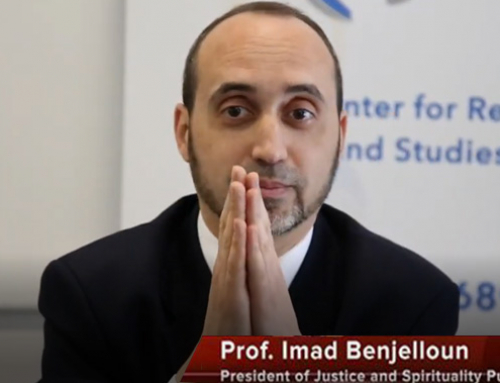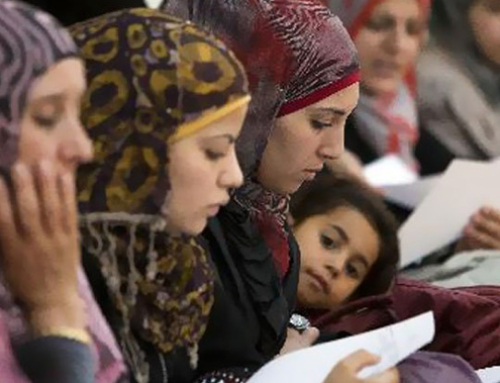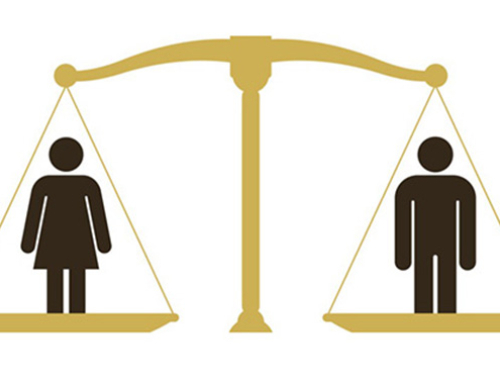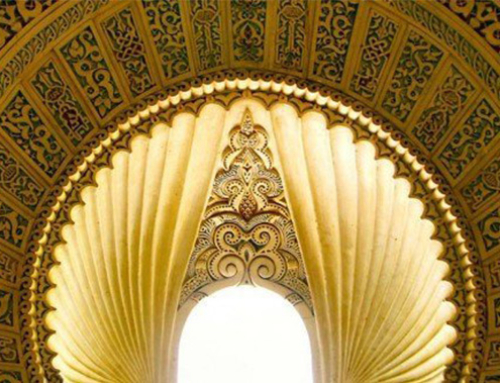Abdessalam Yassine
October 21, 2012
If not for the hereafter, its rewards and the promise of the highest stations in Paradise, its punishment and the threat of the lowest stations of hell, what would have motivated us to believe in God’s existence and be secure in the belief that the universe has a Lord Who created it, a Lord Who is Omniscient, All-Wise, and Omnipotent. What motivates the believing men and women to do good, and what sustains the ethos in the Muslim society other than the fear of God’s punishment and the desire to earn His reward in the hereafter.
The Muslim women and men heard that God dispraised this world’s lure and luxury that cause heedlessness of the hereafter. They learned that after death there is Resurrection, Judgement, the Balance (where deeds will be weighed), the Bridge (over hell which the blessed will cross and the wretched will not and fall into hell], Reward in Paradise, and Punishment in hell. The believing women and men therefore contented themselves with what God judged as lawful and refrained from what He judged as unlawful. Some of them showed total disinterest in worldly pleasures. The Sincere amongst them like ‹Abd al-Rahman ibn ‹Awf, one of the Ten Companions (1) to whom God and His Messenger promised Paradise in their lifetime, shed tears from fear this world should spoil their hereafter.
When the believing women and men heard God say: “And verily the hereafter is better” (93:4) and “But the hereafter is better and everlasting” (87:17), they preferred the hereafter to this world and worked according to that preference.
When they heard God say: “But verily the Hereafter is greater in ranks and greater in distinction” (17:21), they vied among each other, hurrying in quest of the hereafter. Their ambition aimed at the hereafter because they read the verses where God says: “Unto him who cares for (no more than the enjoyment of) this fleeting life We readily grant thereof as much as We please, (giving) to whomever it is Our will (to give). But in the end We consign him to (the suffering of) Hell, which he will have to endure disgraced and disowned. But as for those who care for the (good of the) Hereafter and strive for it as it ought to be striven for while they are (true) believers, they are the ones whose striving is acceptable (to God)” (17:18-19). So, they became passionately attached to the hereafter. How blissful, indeed, is the eternal bliss!
A group of the believing men and women had their attention attracted, and then were inhabited by the following verse: “And keep your self patient with those who call their Lord morning and evening, seeking His Countenance; and let not your eyes pass beyond them in quest of the beauties of this world’s life; and pay no heed to any whose heart We have made heedless of all remembrance of Us because he had always followed (only) his own passions, abandoning all that is good and true.” (18:28) Seeking His Countenance, seeking His Countenance!
There is, then, something more sublime, more sacred, and more blissful than Paradise and its adornments and comforts! This was confirmed to them by the hadith qudsi (2) in which God, Exalted is He, invites His servants to come closer to Him.
A glorious journey it is, which gradually raises the believer’s will from being skeptical about the allure of this world to being disinterested in its unlawful and doubtful pleasures, to being attached to the hereafter and, eventually, seeking God’s Countenance. A glorious journey it is, in which the Companions (God be pleased with them) found a guide and a teacher in the person of God’s Messenger, God bless him and grant him peace.
The tabi‹un searched and found in the Companions guides and friends. And each virtuous generation found in the former generation righteous guides and close friends. As a confirmation of this practice from the sunna of God’s Messenger, God bless him and grant him peace, they have the following hadith: “Every person acquires spiritually the din [islam, iman, ihsan] of his best friend.” From the Qur›an they have the following verses: “On that Day [of Judgement], close friends will be foes to each other—(all) except for the Righteous. (And God will say:) ‘O you servants of Mine! No fear need you feel today, and neither shall you grieve, for you believed in Our messages and were Muslims. Enter the Garden, you and your wives, in eternal bliss.’ ” (43:67-70)
To that sublime position leads close friendship between the righteous, and to that eternal bliss leads the company of pious spouses.
Some of the hadiths of the Prophet, God bless him and grant him peace, warn and upbraid women. For instance, he said, God bless him and grant him peace: “Few among the inhabitants of Paradise are women.” Hadith reported by Imam Ahmad on the authority of ‹Imran ibn Husayn (God be pleased with him). He also said: “I looked into hell and found that most of its inhabitants were women.” Hadith reported by Imam Ahmad, Muslim, and al-Tirmidhi on the authority of ‹Abdullah ibn ‹Abbas (God be pleased with both of them) as well as by al-Bukhari and al-Tirmidhi on the authority of ‹Imran ibn Husayn (God be pleased with him). The Prophet, God bless him and grant him peace, explained that the main reason was that women tend to be ungrateful to their husbands and treat them in unbecomingly harsh manners. These reproaching hadiths should always be considered side by side with the hadiths and verses in which we were informed that God always and unfailingly rewards His servants’ good deeds, and that whoever does good with belief in their heart, whether man or woman, God will surely make theirs a good life.
There are believing women who wonder why God, Exalted is He, did not mention the bliss and comfort of the believing women in Paradise as He mentioned that of the believing men with their beautiful heavenly companions dwelling in luxurious pavilions. God knows best. It is a sign of impertinence to inquire about what God and His Messenger have kept secret. Also, it is a sign of unbelief and lack of confidence in God’s justice that a believing woman should think that man’s bliss and comfort in Paradise is better than the woman’s. Every man and woman will be granted their due reward.
Then there is a believing woman so intoxicated by her love of God and so overwhelmed by her yearning for Him that her love of Him makes her blind to this world and to the hereafter alike. She says:
I care not about Paradise or Hell. I want nothing but my Love
The verse is by Rabi‹a al-‹Adawiyya, the Sufi ascetic (God have mercy upon her). These are the words of someone overcome by ecstasy and lost in divine beauty.
Can the desire for God be joined with the desire for Paradise? In the writings of such great saints as Shaykh ‹Abd al-Qadir al-Jilani, we read that showing disinterest in this world and in the hereafter are two necessary steps before one can even wish to see God’s Countenance. You place this world behind you, then the hereafter, its comfort and luxury, as well.
Does that mean that one draws nearer to God by showing disinterest in what He praised. When one abstains from the unlawful pleasures of this world, contents one’s self with only a little of its lawful pleasures, and feeds the poor and the needy from one’s own money, one is surely performing acts that draws them nearer to God. But to show disinterest in the hereafter, in the usual sense that comes to mind, is indeed a sign of ingratitude and disrespect.
What the great saints (God have mercy upon them) mean (by leaving this world and the next behind) is that you should totally cast out of your heart both this world and the hereafter. For the heart is the exclusive center of God’s attention. Aside from that, the nafs is given its rights and is allowed its pleasures, which it was promised will all be fulfilled in heaven, in the most enticing and detailed descriptions. Praise be to God. We pray to Him to fill our hearts with the bliss of his intimate gnosis and to place our nafs in the highest stations of Paradise and grant it the eternal bliss He described to us.
Base and earthbound intentions whose sole preoccupation is the gratification offered by the life of this world is further abased by evil company. Likewise, close friendship for the sake of God, associating with the virtuous, and holding to those who call their Lord morning and evening, seeking His Countenance, raises man’s will until his heart becomes attached to its Lord and his self’s desire becomes His abode (in Paradise).
The blessed believers wonder amongst themselves in Paradise, and then question the sinning criminals in hell: “What has brought you to hell-fire?” They will answer: “We were not among those who prayed, and neither did we feed the needy; but we used to engage in vain discourse with those who engaged in vain discourses, and we used to deny the Day of Judgment until certainty came upon us (in death)” (74:41-46). “With those who engaged in vain discourse”—that is what caused their demise. So let every soul look with whom it keeps company.
The People of Paradise ask after each other in Paradise. Then one of them will say: “I had (on earth) a close friend who used to say, ‘What! Are you really of those who believe it to be true (that) after we have died and become dust and bones we shall indeed be brought to judgment?’ (And) he adds: ‘Would you like to look down (and see him)?’ He looked down and saw him in the midst of the blazing fire, and says: ‘By God! You had almost caused me to perish! Had it not been for my Lord’s favor, I would certainly have been among those brought (there)!” (37:51-57)
Evil company nearly ruined that blessed man whom God rescued by His grace and favor from the claws of the evil companion.
The matter is all about a good companion, a close friend who walks with you on the way to happiness, or an evil companion who pulls you down into the darkness of heedlessness, into leaving prayer and holding back from the needy, and into denying the Day of Judgement.
There was an abundance of righteous men and women in the virtuous centuries of Islam whose company one could keep. Where, now, are the righteous in the age of computers, satellite dishes, missiles, and atoms? How desperately are they needed in the midst of this world’s racket and mania.
What God, Exalted is He, has reserved by His divine providence for the later generations of this umma rewards for sure their endurance of ordeals that have grown more intense. The tougher the ordeal, the greater the reward. God’s Messenger, God bless him and grant him peace, said to his Companions: “There will come after you days of extreme endurance. In them enduring (hardships and temptations) will be like holding flaming embers in one’s hands. In them the well-doer will be given the reward of fifty men who do your same righteous deeds.” Hadith reported by al-Tirmidhi and Abu Dawud. Abu Dawud added in his reported version of the hadith: “They said, ‘O Messenger of God! The reward of fifty men! Among us or among them?’ He said, ‘Rather, the reward of fifty men among you.’ ”
The hadiths foretelling that a group of this umma will remain on the right path until the Day of Resurrection are numerous in the books of authenticated hadiths. The following is a reliable hadith reported by al-Tirmidhi on the authority of Anas (God be pleased with him). Anas said: “God’s Messenger, God bless him and grant him peace, said: ‘The simile for my umma is rain: no one knows where its good lies—in the beginning or in the end.”
The door of divine generosity is open, but the same condition applies for this umma—whether for the first or the later generations. The condition is pure intention, devotion, doing good with sincerity, and following the steps of the guiding Messenger. The divine promise holds for any servant, woman or man, who meets the condition. Whoever strives, through his pure intention, devotion, good work, and following of the Prophet, for the hereafter and its comfort and adornments, God will certainly not fail to reward one who is best in deed. As for those whose intention was exalted, by divine providence and guidance—something God grants exclusively to the chosen among His servants, women and men—to seeking God’s Countenance, those who keep their selves patient, who call on their Lord morning and evening, knock at His door, implore Him earnestly, and call on Him with distressed souls, those whose hearts are devoted to their Lord, they are the ones meant by the hadith qudsi that the Interpreter, God bless him and grant him peace, reported from his Lord. He said: “God, Exalted is He, said: ‘If My servant draws nearer to Me by one inch, I will draw nearer to him by one cubit. If he draws nearer to Me by one cubit, I will draw nearer to him by one span. If he comes towards Me walking, I will come towards him running.’” Hadith reported by al-Bukhari and Muslim on the authority of Abu Hurayra (God be pleased with him).
In another narration, God said, Glorified is He: ‘I am as My servant expects Me to be, and I am with him when he remembers Me. If he remembers Me [privately] in his self, I will remember him in My Self. If he remembers Me in an assembly, I will remember him in a far better assembly.”
To think good of God, to expect good from Him, to seek to draw nearer to Him, to engage diligently in His remembrance, and to join virtuous assemblies. Where can one find those blessed assemblies after the virtuous centuries?
The virtuous century is that of the Companions. Next in rank are foremost outstrippers, who were drawn close to the divine, for whom God’s Messenger, God bless him and grant him peace, longed. One day, he visited with his Companions the cemetery. No doubt the martyrs buried there and the attending Companions reminded him of some virtuous groups of his umma. He said: “I wish I had seen our brothers.” They said: “Aren’t we your brothers, O Messenger of God?” He said: “You are my Companions. Our brothers are those who have not yet come.” The hadith is reported by al-Bukhari, Muslim, and others on the authority of Abu Hurayra (God be pleased with him).
Righteous people will come after the Prophet, God bless him and grant him peace, whom he ranked as his brothers, a position that parallels or neighbors that of his Companions. Those are people who love God and His Messenger, a dual love that is like two wings for those whom God qualified to soar high in that sublime horizon. God’s Messenger, God bless him and grant him peace, said: “Among those of my umma who love me the best are some people who will come after me. One of them would love to see me in return for all his family and wealth.” Hadith reported by Muslim on the authority of Abu Hurayra.
O Lord, admit us among them by Your grace and favor!
References
| ↑1 | [Translator’s note:] The Ten Companions who were promised Paradise in their lifetime are Abu Bakr, ‹Umar, ‹Uthman, and ‹Ali (the four Rightly-Guided Caliphs), Talha ibn ‹Ubaydillah, al-Zubayr ibn al-‹Awwam, Sa‹d ibn Abi Waqqas, Sa‹id ibn Zayd, Abu ‹Ubayda ibn al-Jarrah, and ‹Abd al-Rahman ibn ‹Awf (God be pleased with them). |
|---|---|
| ↑2 | [Translator’s note:] A hadith that reports something revealed to the Prophet, God bless him and grant him peace, by God, Exalted is He, but which is expressed in the Prophet’s own words. |








